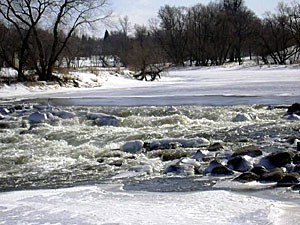Photos
Resources
Your Voice
| ||||||||||||||||||||||||||||||||||||||||||||||||
Support for clean waters may help environmental bill's chances
March 15, 2004
 |
| The Red River rapids in Moorhead. The river is on the list of 'impaired rivers.' (MPR Photo/Bob Reha) |
St. Paul, Minn. — (AP) A bill that would give voters a chance to create an annual pool of money to clean up Minnesota's lakes and rivers is working its way through the Legislature with a strong ally: the governor.
The legislation would set a referendum on whether the state constitution should be amended so that one-quarter of 1 percent of the state sales tax is set aside each year for 20 years for environmental programs, including water restoration.
 | |||
Similar attempts to get money for outdoors programs have failed in the past, and this year's version again faces opposition. But Gov. Tim Pawlenty has said that cleaning up one of the state's natural treasures - its lakes and streams - is a cornerstone of his administration. A bill seeking the annual tax money last year didn't include the money for waters, which was in separate legislation.
"Water is a real priority this time around, and I think that will enhance getting it passed," said Roger Pederson, who directs conservation programs for Ducks Unlimited in Iowa and Minnesota. "Waters are so impacted that they're to the point where they don't have the ecological vitality they once had."
Pawlenty's office says the governor supports the dedication of sales tax revenue for environmental programs but also wants to find a longterm funding source.
The Minnesota Pollution Control Agency - whose report on the status of lakes is the basis for the funding request - lists cleaning up lakes and rivers as its top priority. The agency lists 1,916 lakes and streams as "impaired," meaning they contain harmful levels of pollutants like mercury or excess nutrients like nitrogen.
The list, first released in 1998 as part of the federal Clean Water Act, has grown in recent years as the agency collects more data on water quality. It's estimated that 10,000 lakes and streams could be on it by 2014.
Cleaning waters and rivers is just one part of the bill. Of the money that would be set aside from the sales tax, about $50 million would be used each year for the MPCA's impaired waters program. If it passes the Legislature, the idea would be put before voters on the November ballot.
Finding support for such a bill is difficult because taking part of the sales tax hurts the general fund, said Dorian Grilley, the executive director of the Parks and Trails Council of Minnesota.
But Grilley said a stable source of money is needed because of "the roller-coaster of the state budget."
In tight budget times, however, opponents of the bill wonder why tax money should be dedicated to the environment. Rep. Phyllis Kahn, a Minneapolis DFLer, tried to amend the bill so that another one-quarter of 1 percent of the sales tax would be set aside for education. Her amendment was ruled out of order in the House Environment and Natural Resources Finance Committee, which passed the bill to a tax panel.
Kahn said she was trying to make the point that setting aside the revenue - about $170 million each year - leaves less money for other areas. A better way would be to add the same amount to the tax base, she said.
"Because of the fiscal problems of the state, there have been cuts in child care and cuts in personal care assistance. Under those circumstances, to cut further into the (tax) base seems manifestly unfair," Kahn said.
Rep. Dennis Ozment worked to include money for impaired waters in the bill, arguing that making a bigger link between environmental protection and Minnesota's storied outdoors life would boost its chances.
"It's a coalition of like interests," said Ozment, a Rosemount Republican who is co-sponsoring the bill. "Sporting groups, for instance, are very dependent on good quality water for duck habitat and wildlife. What we are doing is combining the interests of environmental and recreational groups. They all have different uses, but all want to have clean water."
The pollutants causing most of the trouble in Minnesota's water come from routine activities such as driving cars, fertilizing lawns and agricultural and stormwater runoff, the MPCA said.
The Clean Water Act requires states to prepare studies called Total Maximum Daily Loads for each impairment on the list. That defines the maximum amount of a pollutant a water body can receive and still be safe for things like fishing, swimming and drinking.
|
News Headlines
|
Related Subjects
|

